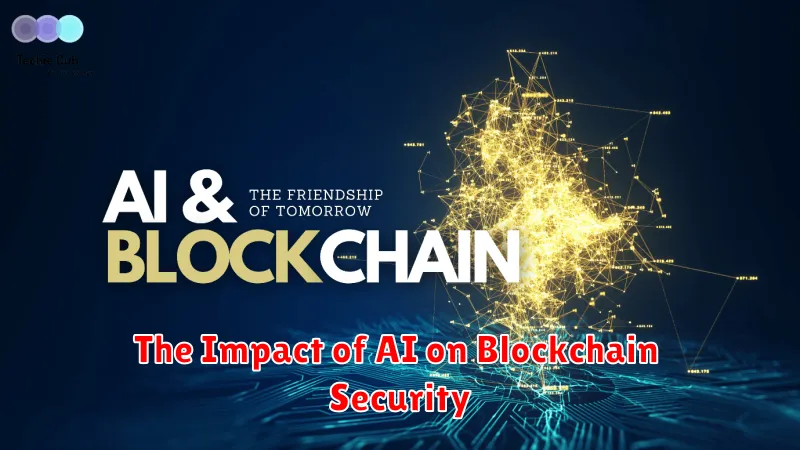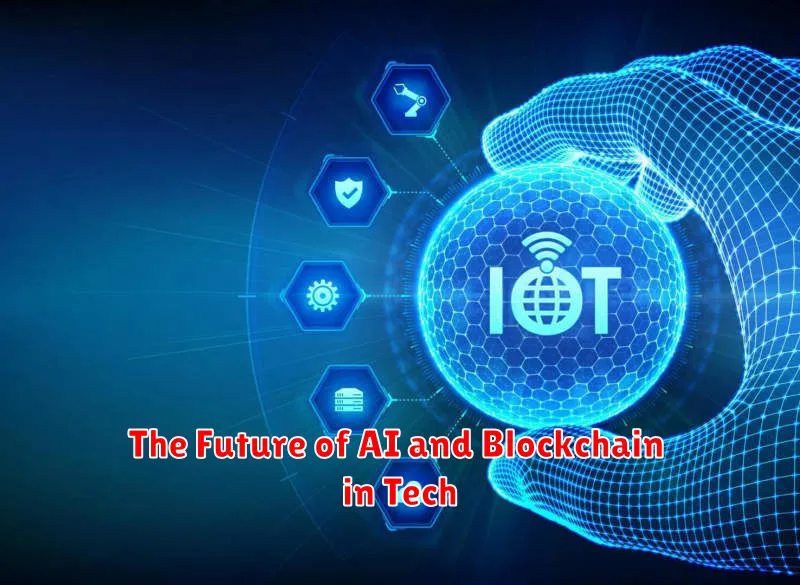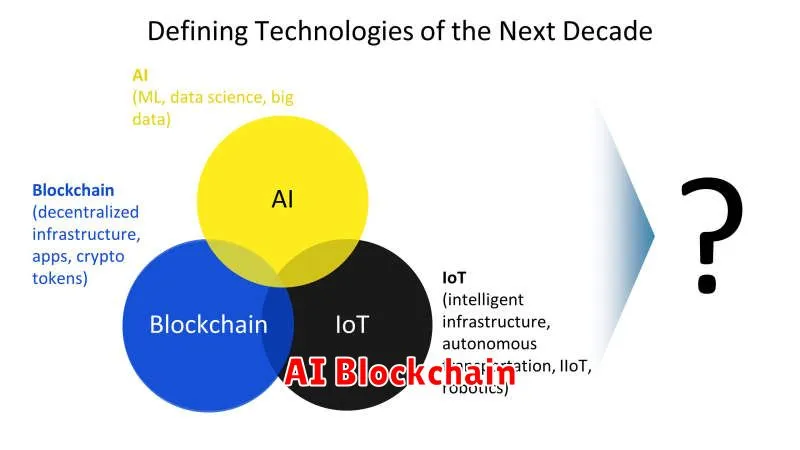In the rapidly evolving landscape of technology, two groundbreaking forces, artificial intelligence (AI) and blockchain, are converging to reshape our world in unprecedented ways. These transformative technologies, once perceived as separate entities, are now intertwining to create a powerful synergy that promises to revolutionize industries, enhance efficiency, and empower individuals. From healthcare to finance, supply chain management to governance, the impact of AI and blockchain is already being felt across various sectors, leaving a lasting mark on the future.
The convergence of AI and blockchain is fueling innovation at an exponential rate, unlocking new possibilities that were previously unimaginable. AI’s ability to analyze vast datasets and make intelligent decisions, coupled with blockchain’s inherent security, transparency, and immutability, creates a potent combination that is driving the development of cutting-edge applications. This article delves into the intricacies of these technologies, exploring their individual strengths and how their integration is shaping the future.
Understanding the Basics of AI and Blockchain
Artificial intelligence (AI) and blockchain are two transformative technologies that are rapidly changing the world. While they are often discussed separately, understanding their fundamental concepts is crucial for comprehending their impact and potential synergy.
AI, in simple terms, is the simulation of human intelligence processes by computer systems. It involves creating algorithms that enable machines to learn from data, solve problems, and make decisions. These algorithms can be trained on vast datasets to perform tasks such as image recognition, natural language processing, and predictive analysis.
Blockchain, on the other hand, is a decentralized and secure digital ledger that records transactions in a transparent and immutable way. It consists of blocks of data linked together in a chain, with each block containing information about a transaction. Each block is cryptographically secured, making it virtually impossible to alter or tamper with the records.
Understanding these basic principles of AI and blockchain sets the stage for exploring their applications and how they are shaping the future across various industries.
How AI and Blockchain Work Together
Artificial intelligence (AI) and blockchain are two transformative technologies that are rapidly changing the world. While they seem distinct, they complement each other in powerful ways, creating synergistic solutions. At the heart of their synergy lies the ability of AI to analyze vast amounts of data stored securely and transparently on blockchain, unlocking unprecedented insights and possibilities.
AI, with its capacity for pattern recognition and predictive modeling, can enhance the functionality of blockchain. By analyzing blockchain data, AI can identify trends, anomalies, and potential risks, improving security, optimizing processes, and facilitating more informed decision-making. This can be applied in various fields, such as supply chain management, where AI can track products and predict potential disruptions based on blockchain records.
Moreover, AI can also automate and streamline blockchain processes. For example, AI-powered smart contracts can automatically execute transactions based on pre-defined conditions, eliminating the need for manual intervention. This can significantly reduce transaction costs and improve efficiency. Additionally, AI can help to improve the scalability of blockchain by optimizing network performance and reducing congestion.
In essence, AI and blockchain are intertwined, each amplifying the capabilities of the other. By leveraging their collective strengths, we can unlock a new era of innovation, efficiency, and security, ushering in a future where trust, transparency, and intelligence prevail.
The Impact of AI on Blockchain Security

The integration of Artificial Intelligence (AI) into blockchain technology is transforming the landscape of cybersecurity. AI’s ability to analyze vast amounts of data, identify patterns, and predict threats makes it a valuable asset in bolstering blockchain security. By leveraging machine learning algorithms, AI can detect and prevent fraudulent transactions, identify anomalies, and strengthen network integrity.
One of the key ways AI enhances blockchain security is by detecting and mitigating malicious activities. AI-powered systems can analyze transaction patterns and identify suspicious behavior, such as sudden spikes in activity or unusual transfer amounts. This real-time monitoring helps prevent fraudulent transactions and protect the integrity of the blockchain.
Furthermore, AI can strengthen blockchain security by identifying vulnerabilities in smart contracts. Smart contracts, which automate agreements on the blockchain, are susceptible to errors and exploits. AI algorithms can analyze smart contract code to identify potential vulnerabilities and suggest improvements, reducing the risk of attacks.
AI’s role in blockchain security extends beyond detecting and preventing threats. It also plays a crucial role in enhancing security through proactive measures. AI can be used to develop advanced security protocols, improve cryptographic algorithms, and strengthen consensus mechanisms, making the blockchain network more resilient against attacks.
In conclusion, the impact of AI on blockchain security is profound. By leveraging its analytical capabilities, AI can detect threats, prevent fraud, identify vulnerabilities, and enhance overall security. As AI technology continues to evolve, its role in safeguarding blockchain networks will become increasingly important, ensuring the continued growth and adoption of this transformative technology.
Real-World Applications of AI and Blockchain
Artificial intelligence (AI) and blockchain are two transformative technologies rapidly reshaping industries across the globe. While they may seem disparate, their combined power offers unprecedented opportunities for innovation and efficiency.
One prominent application is in supply chain management. Blockchain’s immutable ledger can track goods’ movement from origin to destination, enhancing transparency and accountability. AI can further optimize this process by analyzing data patterns to identify bottlenecks, predict demand, and automate inventory management.
In the healthcare sector, AI and blockchain are revolutionizing patient data management. Secure and decentralized storage on blockchain platforms protects sensitive medical records, while AI can analyze data for personalized treatment recommendations and disease prediction.
Financial services are also benefiting from this synergistic duo. Blockchain technology enables secure and transparent cross-border transactions, while AI algorithms enhance fraud detection, risk assessment, and personalized financial advice.
Beyond these specific areas, AI and blockchain are driving advancements in education, energy, and government. These technologies are empowering individuals and institutions to create more efficient, secure, and equitable systems.
Challenges in Integrating AI with Blockchain
While the integration of AI and blockchain offers immense potential, several challenges stand in the way of realizing this vision. One major challenge is the lack of interoperability between the two technologies. AI algorithms often require large datasets, which may not be readily available on blockchains. Additionally, the decentralized nature of blockchain can make it difficult for AI algorithms to access and process data in a timely and efficient manner.
Another significant challenge is data privacy and security. Blockchain is inherently transparent, meaning that all transactions are recorded on a public ledger. This can pose risks to the privacy of AI training data, which often contains sensitive information. Furthermore, AI algorithms themselves can be vulnerable to attacks, potentially leading to malicious manipulation of blockchain networks.
The computational complexity of integrating AI with blockchain is also a major hurdle. AI models can be computationally intensive, requiring significant processing power that may not be available on decentralized networks. Moreover, the energy consumption associated with blockchain transactions can pose environmental concerns, further complicating the integration process.
Finally, there is a lack of standardized frameworks for integrating AI with blockchain. This makes it difficult for developers to create robust and interoperable solutions. More research and development are needed to establish clear guidelines and best practices for integrating these two transformative technologies.
The Future of AI and Blockchain in Tech

Artificial intelligence (AI) and blockchain are two of the most transformative technologies of our time. While they seem distinct, they have the potential to revolutionize various sectors by working in tandem. This union promises a future where data security, transparency, and efficiency reach new heights.
AI’s ability to analyze vast amounts of data can enhance blockchain’s functionalities. This includes improving transaction speed and accuracy, identifying fraudulent activities, and optimizing smart contracts. Moreover, AI can be employed to develop more sophisticated and user-friendly blockchain applications, making it accessible to a wider audience.
Blockchain, with its inherent security and decentralization, can provide a robust foundation for AI applications. It can safeguard sensitive data used by AI systems, ensuring privacy and preventing manipulation. Additionally, blockchain can create a transparent and verifiable ecosystem for AI development, enhancing trust and accountability.
As AI and blockchain continue to evolve, their integration is likely to lead to exciting innovations across various industries. In the realm of healthcare, AI-powered applications on blockchain can securely store and manage patient data, facilitating personalized medicine and research. Finance can benefit from AI-driven risk assessment and fraud detection, while supply chain management can be streamlined through AI-powered tracking and optimization powered by blockchain.
While the future holds immense potential, it is crucial to acknowledge the ethical and societal implications of AI and blockchain integration. Ensuring responsible development and equitable access to these technologies will be paramount in shaping a future where they benefit all of humanity.

